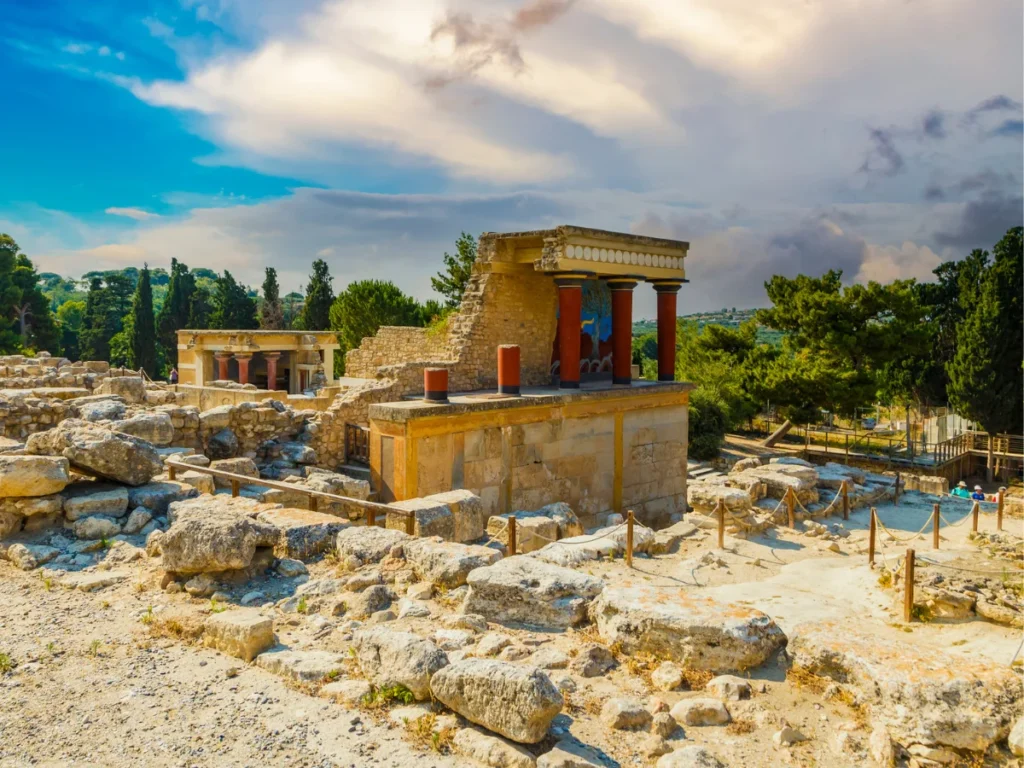Other Empires in Ancient Greece
Some other empires in ancient Greece, such as the Minoan, Roman and Byzantine left indelible imprints on the region’s culture and heritage. The Minoans played a pivotal role in shaping early Greek civilization with their advanced art and trade. The Romans assimilated Greek culture, while the Byzantines preserved Greek Orthodoxy and intellectual traditions. Together, these empires contributed to the rich tapestry of ancient Greek civilization.

Here are some other Empires in Ancient Greece
Minoan Empire: Shaping the Cradle of Greek Civilization
The Minoan Empire, flourishing around 2000-1500 BC, was instrumental in shaping the foundations of ancient Greek culture. Located on the island of Crete, the Minoans greatly influenced the early Greek-speaking peoples through their advanced art, architecture, and maritime trade. Their rich artistic heritage, characterized by vibrant frescoes and intricate pottery, significantly impacted Greek art. This empire laid the groundwork for the subsequent Greek civilizations and their artistic expressions.
The Mycenaean Civilization
The Mycenaean Civilization, a thriving Bronze Age society in ancient Greece from roughly 1600 to 1100 BC, left an indelible mark through its vibrant trade networks, the development of the Linear B script, grand palatial complexes, and intriguing tholos tombs. While its eventual decline was inevitable, this civilization’s enduring influence on Greek culture, language, and architectural traditions remains palpable, firmly establishing it as a pivotal chapter in the annals of ancient Greek history.
Roman Empire: Conquest and Cultural Assimilation
The Roman Empire’s conquest of Greece in the 2nd century BC brought profound changes to the region. The Romans, while initially viewing Greece as a repository of culture and knowledge, eventually absorbed and synthesized Greek culture into their own. This period, known as the Greco-Roman era, witnessed the coalescence of Greek and Roman traditions in art, literature, and philosophy. Prominent Greek thinkers like Aristotle and Plato continued to influence Roman thought and shaped the intellectual landscape of the Roman Empire.
Byzantine Empire: The Christian Continuation
The Byzantine Empire, a continuation of the Eastern Roman Empire, preserved and furthered Greek culture after the fall of the Western Roman Empire. Byzantium was the guardian of Greek Orthodoxy and played a significant role in the spread of Christianity. Greek language, literature, and philosophy continued to thrive within the empire, with scholars like Gregory of Nazianzus and John Chrysostom making profound contributions to Christian theology. Byzantium’s influence extended beyond its borders, shaping medieval European thought and culture.
Venetian Empire: A Glimpse into Western Influence
Venice’s control of various Greek islands and territories during the Middle Ages introduced a Western European element to Greek culture. Venetian merchants and rulers brought their own artistic and architectural styles to Greece, influencing local aesthetics. The Venetian presence contributed to the development of a unique blend of Eastern and Western cultural elements in Greece.
In summary, these five empires significantly impacted ancient Greece in various ways, shaping its culture, art, and intellectual traditions. The Minoans laid the groundwork for Greek civilization, the Romans assimilated and enriched Greek culture, the Byzantines preserved and expanded Greek Orthodoxy, and the Venetians introduced Western European influences. Each empire left an enduring mark on Greece’s multifaceted cultural heritage, contributing to the rich tapestry of ancient Greek civilization.
